Can You Put a Space Heater on a Table? Safety Tips and Best Practices
Placing a space heater on a table is generally not recommended due to safety risks like tipping over, overheating, and potential fire hazards.
If you must put your space heater on the table, choose a stable, low-temperature model such as an oil-filled radiator or infrared heater with essential safety features like automatic shut-off and tip-over switches. Ensure the table is sturdy, heat-resistant, and located away from flammable materials.
Always consult the heater’s manual for specific guidance on safe operation and consider safer alternatives like wall-mounted or baseboard heaters for risk-free heating. Prioritize safety certifications and follow best practices to protect your home and loved ones from heater-related accidents.
What Kind of Space Heater Can You Put on a Table?
When considering placing a space heater on a table, the safest types are typically oil-filled radiators or infrared heaters due to their stable design and lower surface temperatures. It’s important to check for specific safety features like automatic shut-off and tip-over switches, which are critical for elevated placement.
Choosing the Right Heater for Table Placement:
- Stability and Design: Look for space heaters with a wide base and low center of gravity to minimize the risk of tipping over. Compact and flat-panel designs are usually better suited for table placement.
- Heat Distribution: Consider how the heater emits heat. Models that distribute heat upwards or in a directed manner can be safer for tabletop use, as they are less likely to cause damage to the table surface.
Specific Heater Recommendations:
- Oil-Filled Radiators: Units like the Pelonis NY1507-14A are generally safe for table placement as they are less likely to tip over and do not have exposed elements.
- Infrared Heaters: Heaters such as the Dr Infrared Heater Portable Space Heater provide direct warmth with minimal risk of overheating surrounding areas.
When selecting a space heater for table placement, ensure it has a stable design and safety features appropriate for elevated surfaces. Always consult the manufacturer’s guidelines and consider the heater’s design and heat output to ensure safe operation.
In the next section, we’ll discuss the general safety considerations when using space heaters and the importance of placement and stability.
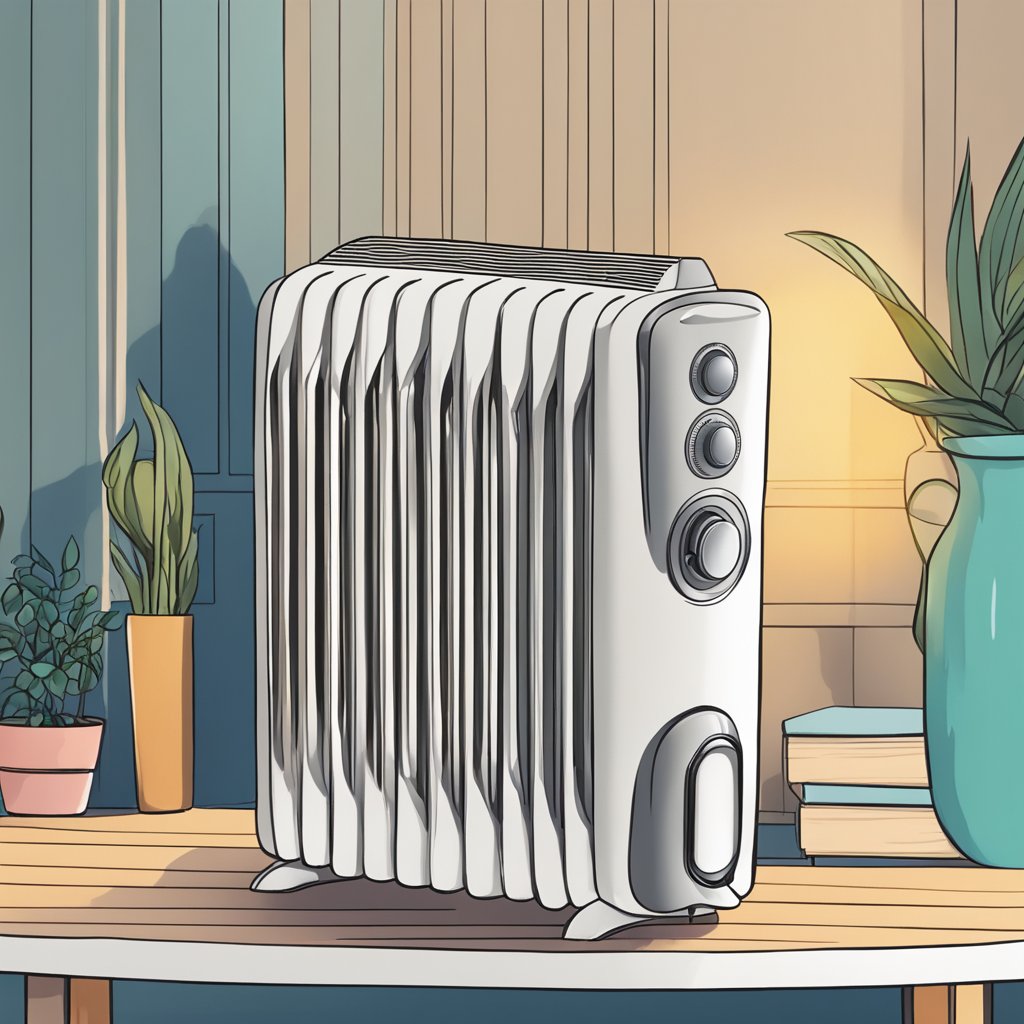
Potential Risks of Placing a Space Heater on a Table
Placing a space heater on a table can present unique risks such as tipping, overheating, and potential fire hazards if not done carefully. It’s important to be aware of these risks and how to manage them effectively.
Potential Hazards and How to Mitigate Them:
- Tipping Risk: Elevated surfaces like tables increase the risk of a heater being knocked over. Choose a heater with a tip-over switch and place it centrally on the table away from edges.
- Overheating: Ensure there’s ample space around the heater for proper airflow and that the table material can withstand the heater’s temperature.
- Fire Hazard: Keep flammable materials away from the heater, maintain a safe distance from other objects, and never leave the heater unattended.
Safety Precautions for Elevated Heater Placement:
- Use a heater specifically rated safe for use on tables or elevated surfaces.
- Regularly inspect the heater and the table for any signs of damage or wear that could pose a risk.
- Consider using a heat-resistant mat under the heater as an extra precaution.
Placing a space heater on a table requires careful consideration of the associated risks. By taking the right precautions and choosing a suitable heater, you can mitigate these risks and safely enjoy the warmth of your space heater.
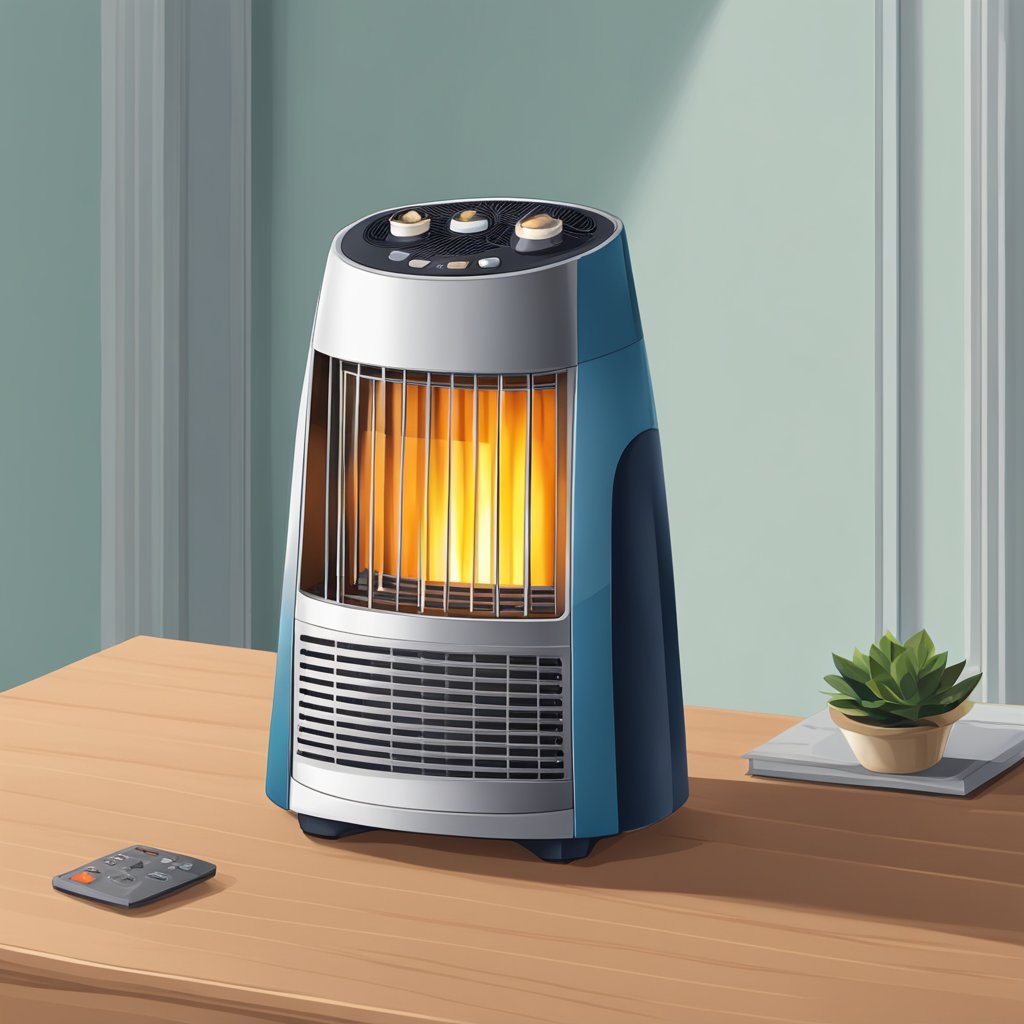
Space Heater Safety – Overview of Important Safety Features
The safest space heaters for any placement, including on tables, have built-in safety features like overheat protection, automatic shut-off, and sturdy, tip-resistant bases. It’s essential to understand these safety mechanisms to prevent accidents and ensure safe operation.
Core Safety Features and Their Importance:
- Overheat Protection: This function turns the heater off automatically if it gets too hot, preventing potential overheating and fires.
- Automatic Shut-off: If the heater is tipped over or if any abnormal operation is detected, this feature will shut the heater down immediately.
- Sturdy Base: A wide, stable base is particularly important for table placement to reduce the risk of the heater tipping over.
Evaluating Heater Safety for Table Use:
- Assess whether the heater is designed for use on non-floor surfaces.
- Check the heater’s weight and dimensions to ensure it’s suitable for the size and strength of the table.
- Verify that the heater’s design includes no risk of damage to the table surface from heat.
Understanding the safety features of space heaters is critical, especially when considering non-traditional placements such as on tables. Always prioritize these features when making your selection and follow the manufacturer’s instructions to ensure safe usage.
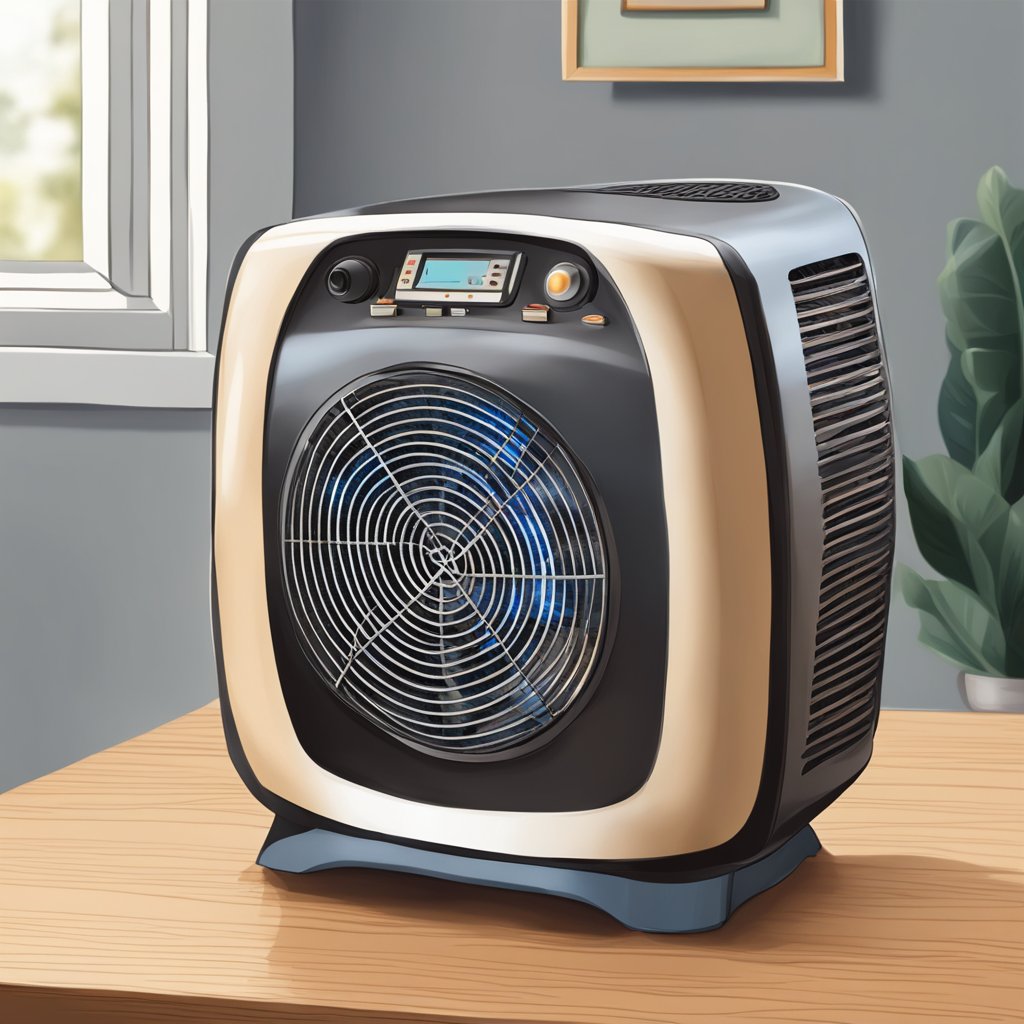
Important Space Heater Safety Features to Consider
When considering placing a space heater on a table, prioritize models with advanced safety features. A heater with an automatic shut-off system, tip-over protection, and adjustable thermostat will not only provide peace of mind but also ensure a safer operation in an elevated position.
Key Safety Features for Elevated Space Heaters:
- Automatic Shut-off: This mechanism turns the heater off automatically in case of overheating, which is crucial when the heater is out of immediate reach.
- Tip-over Protection: Essential for any heater on a table, this feature will shut down the heater if it gets knocked over, helping to prevent potential accidents.
- Adjustable Thermostat: Allows for better control of the heat output, ensuring the heater doesn’t get too hot for the table to handle.
Choosing Heaters with the Best Safety Technology:
- Look for heaters that have been certified by a recognized safety organization, such as UL or ETL.
- Consider models with additional safety features like cool-touch exteriors and timers for automatic turn-off.
Selecting a space heater with the right safety features is crucial, especially when using it on a table. Advanced safety mechanisms like automatic shut-off and tip-over protection are non-negotiable for elevated heating solutions.
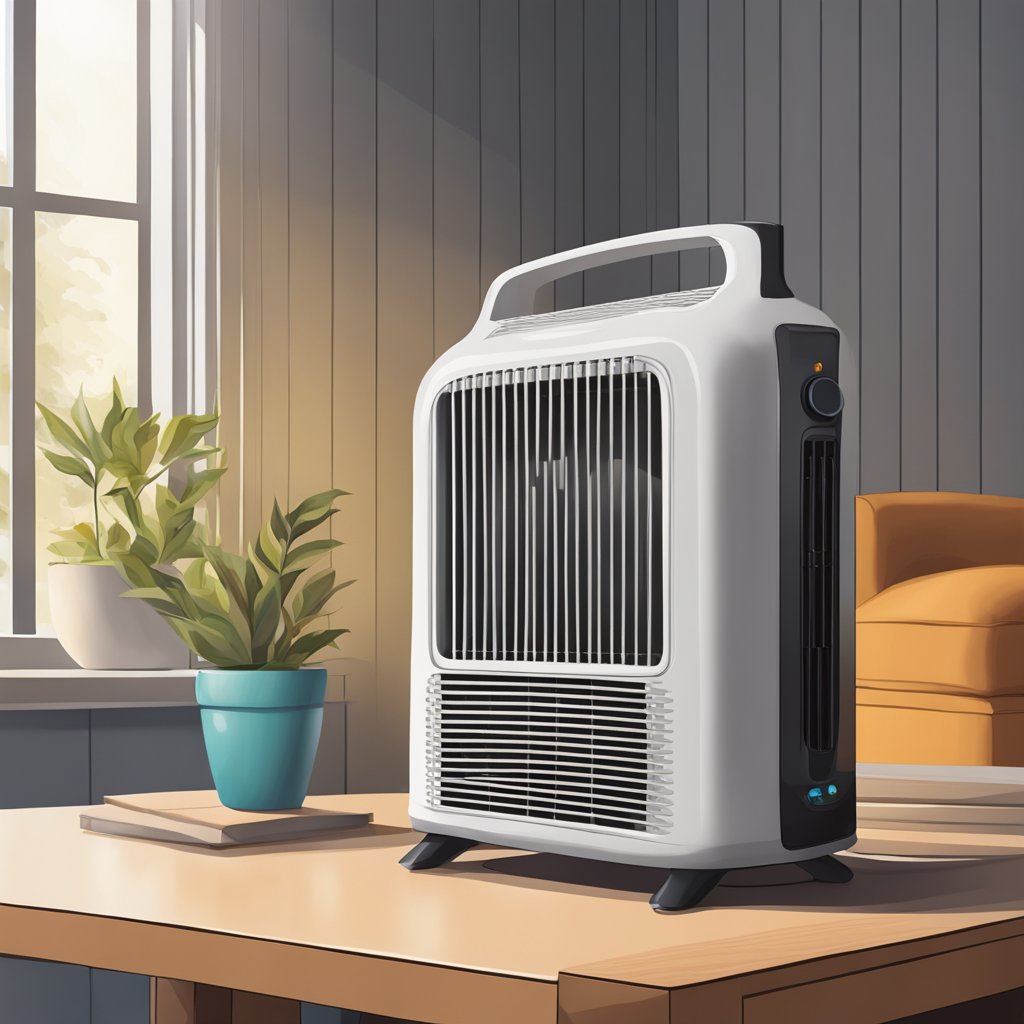
Alternatives to Placing a Space Heater on a Table
While placing a space heater on a table may sometimes seem like a convenient option, there are safer alternatives that can provide warmth without the added risks. Consider wall-mounted heaters, baseboard heaters, or even investing in a heating system that doesn’t require precarious placement.
Safer Heating Alternatives:
- Wall-Mounted Heaters: These are fixed to the wall and offer a permanent solution without the risk of being knocked over.
- Baseboard Heaters: Installed at floor level, they provide steady heat without the need for table placement and are less likely to be obstructed by furniture or other items.
- Central Heating Systems: Though more costly upfront, these can be a safer and more efficient way to heat your home.
Evaluating the Best Heating Option for Your Space:
- Assess the layout and the size of your space to determine the most efficient and safe heating method.
- Consider the long-term safety and cost benefits of permanent heating solutions versus portable heaters.
Alternatives to placing a space heater on a table can offer safer and more efficient ways to heat your space. Evaluate your needs and consider investing in a more permanent solution for long-term safety and comfort.
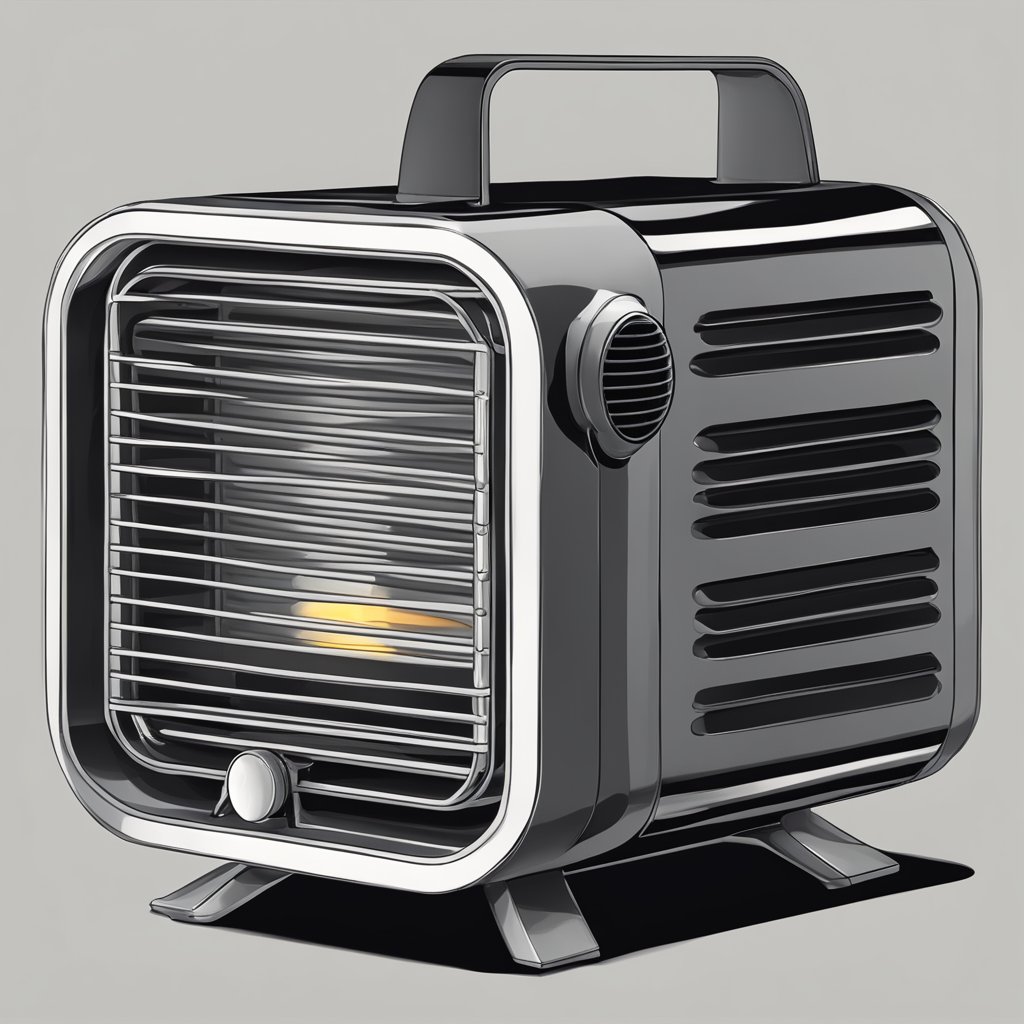
Best Practices for Using Space Heaters
For the safest use of any space heater, including when placed on a table, adhere to best practices that ensure operational safety and efficiency. Always consult the user manual for specific instructions and follow these general tips to maintain a safe environment.
Best Practices for Safe Space Heater Use:
- Proper Placement: Position the heater on a stable, heat-resistant surface and ensure it’s at least three feet away from any flammable materials.
- Direct Connection: Always plug the heater directly into a wall outlet to avoid the risks associated with extension cords or power strips.
- Regular Monitoring: Even with safety features, it’s wise to check on the heater periodically, especially if it’s placed on a table.
Utilizing Heaters Effectively and Safely:
- Understand Your Heater: Familiarize yourself with the heater’s functions and safety features.
- Ventilation: Make sure the room is well-ventilated to prevent a buildup of heat and to allow for proper air circulation.
- Routine Maintenance: Keep the heater clean from dust and debris, which can be a fire hazard and may impede functionality.
Following best practices for space heater usage is crucial for safety and effectiveness, particularly when using a heater in a less common placement like on a table. Adhering to these guidelines will help ensure a warm and safe environment.
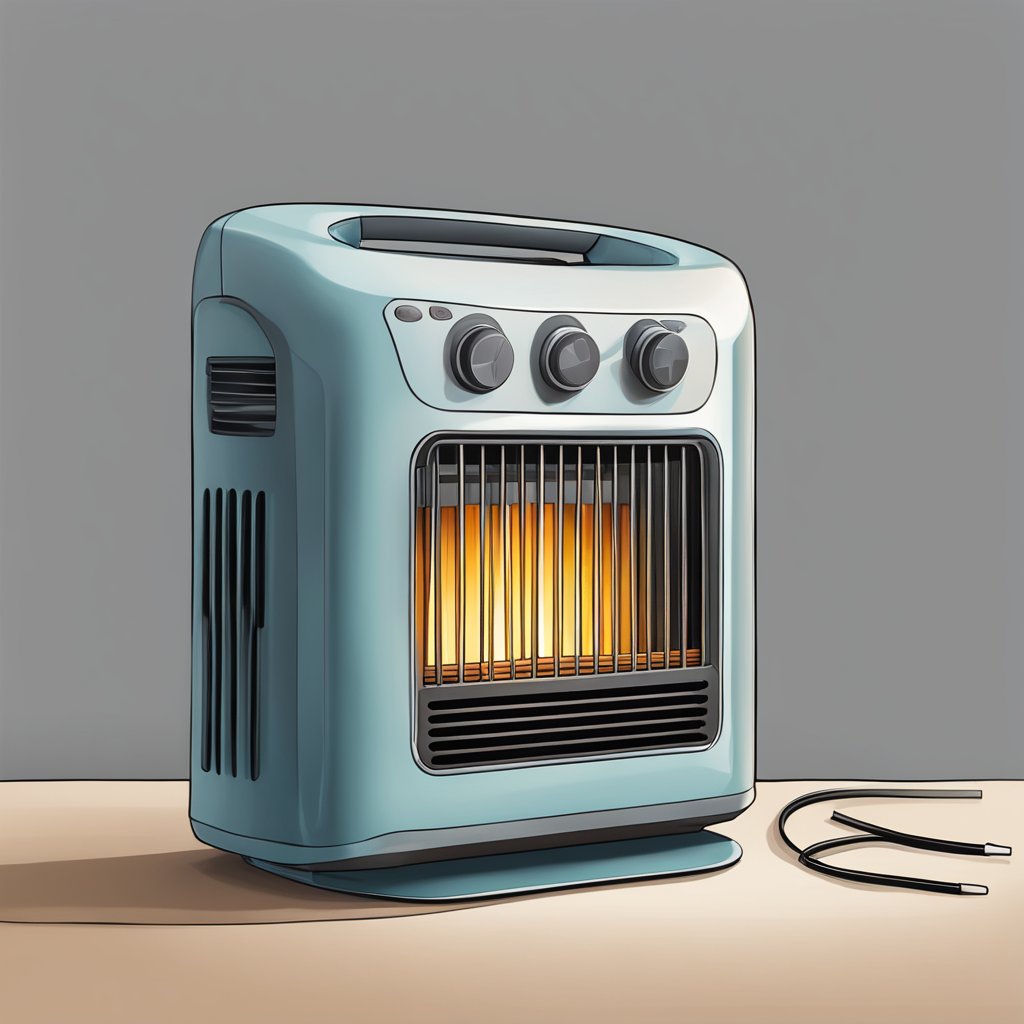
Frequently Asked Questions
In this section, address some of the most common questions readers may have about space heater safety, especially regarding unconventional placements like tables. Provide clear, helpful answers that enhance their understanding and confidence in using space heaters safely.
Addressing Common Concerns:
- Can all space heaters be used on tables?
- What should I do if my space heater doesn’t have an automatic shut-off feature?
- How often should I check my space heater when it’s in use?
Helpful Answers for Space Heater Users:
- Provide concise, informative responses that follow safety guidelines and manufacturer recommendations.
- Offer additional resources for readers who want to learn more about space heater safety.
Answering common questions can dispel myths and educate readers on the best and safest ways to use space heaters. This knowledge empowers them to make informed decisions and maintain a safe home.
How To Respond to Space Heater Incidents
While prevention is the best strategy, knowing how to respond if a space heater incident occurs is crucial. Quick and appropriate actions can prevent damage and save lives.
Immediate Steps for Incident Response:
- Shut Off: Know how to quickly turn off your heater. If it’s safe to do so, unplug it immediately during a malfunction.
- Clear the Area: Remove any flammable materials from around the heater to prevent potential fire spread.
- Evacuate if Necessary: If there is a fire, evacuate the area immediately and call emergency services.
After an Incident:
- Assessment: Once it’s safe, assess the heater for damage. Don’t use it again until it has been checked by a professional.
- Professional Inspection: Have a certified electrician or the manufacturer inspect the heater before resuming use.
- Learn from the Incident: Review what happened and how it could have been prevented to avoid future incidents.
Being prepared to respond to space heater incidents properly can significantly reduce the risk of injury or property damage. Familiarize yourself with your heater’s operation and safety features, and always have a clear action plan for emergencies.
Conclusion: Putting Space Heaters on the Table
To ensure the highest level of safety when using space heaters, choose a model with robust built-in safety features, such as automatic shut-off, tip-over protection, and overheat sensors.
Always place heaters on stable, heat-resistant surfaces, and opt for models with safety certifications from recognized organizations. By adhering to best practices and understanding how to respond to incidents, you can enjoy the warmth of your space heater without compromising the safety of your home and loved ones.
Recap of Key Points:
- Prioritize safety features when choosing a space heater, especially for use on elevated surfaces like tables.
- Follow manufacturer guidelines and safety best practices to prevent accidents.
- Be prepared to respond effectively to space heater incidents to minimize risk.
Staying Warm and Safe: Remember that while space heaters can make your space more comfortable, safety should never be an afterthought. Use the tips and information provided in this guide to make informed decisions about purchasing and using space heaters.
Check Out Our Complete Guide to Space Heaters!
If you enjoyed this post, check out our complete guide to space heaters for more information on space heater types, safety features, troubleshooting common issues, and how to choose the right space heater for your needs!
Let Us Know How We’re Doing!
Did this expertly prepared resource answer your question?
Do you have another question about home maintenance, home improvement projects, home appliance repair, or something else?
Get more information, send in questions and keep the discussion going by contacting the I’ll Just Fix It Myself company customer service team at at 1-800-928-1490 or Email us at [email protected]
